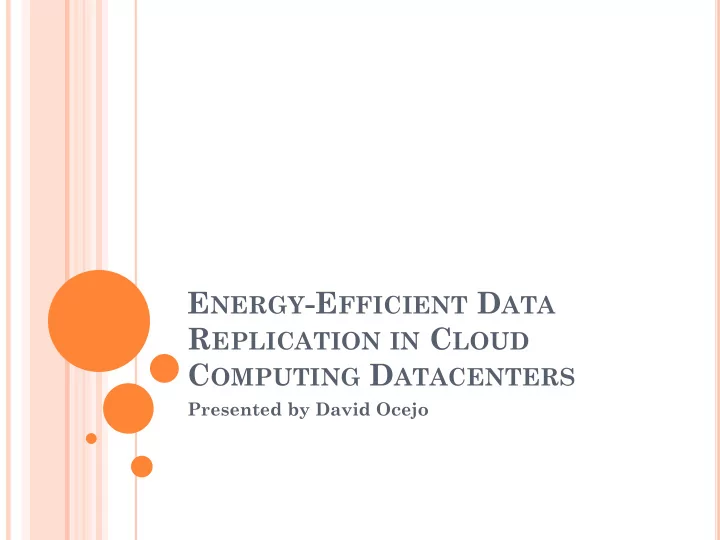

E NERGY -E FFICIENT D ATA R EPLICATION IN C LOUD C OMPUTING D ATACENTERS Presented by David Ocejo
O VERVIEW ¢ Problem ¢ Saving Energy (“Solution”) Efficiency Data Center Topology ¢ Simulation Conditions Results
P ROBLEM ¢ Increasing energy consumption ¢ Up to 1.5% of World’s Electricity (in 2010) from 1.0% (in 2005)
W ORLD ’ S E LECTRICITY G ENERATION 5% 5% Coal 11% 40% Natural Gas Hydro Nuclear 16% Oil Other 23%
D ATA C ENTER E NERGY C ONSUMPTION 15% Cooling Power Distribution 40% Networking 45% Servers
E NERGY E FFICIENCY ¢ Two approaches: Shutting down components Scaling down performance
E NERGY E FFICIENCY ¢ Shutting Down Components Dynamic Power Management (DPM) Dynamic Network Shutdown (DNS)
E NERGY E FFICIENCY ¢ Scaling Down Performance Dynamic Voltage and Frequency Scaling (DVFS) ¢ Applicable only to CPU ¢ Other components still consume at peak rates Dynamic Voltage Scaling (DVS) ¢ Links P = V 2 * f ¢ = (supplied voltage 2 ) * (operating frequency)
E NERGY E FFICIENCY ¢ Virtualization
O UR D ATA R EPLICATION A PPROACH ¢ Joint optimization of energy consumption and bandwidth capacity ¢ Optimization of communication delays
D ATA C ENTER ¢ Three Tier Topology Core Layer ¢ Flows going in and out of data center Aggregation Layer ¢ Integrates connections and traffic flows from racks Access Layer ¢ Where computing servers are arranged into racks
D ATA C ENTER
D ATA C ENTER
D ATA C ENTER ¢ External requests directed to Rack DB If necessary, Database DB and Central DB ¢ Databases maintain and exchange access records Requesting (rack) server and database Number of data item accesses and updates ¢ Popularity Access rate: number of access events in given time period Decays
D ATA C ENTER
D ATA C ENTER T RANSMISSIONS ¢ Uplink – Bandwidth Propagating database requests Updating data items ¢ Downlink – Bandwidth Delivering workload descriptions Receiving database objects Propagating updates between DB replicas
P OWER C ONSUMPTION - S ERVERS 1 Peak Fixed − − Fixed ( )( 1 load e ) a = + + − 2 ¢ Servers consume two-thirds when idle Memory modules, disks, I/O, etc. still consuming at peak rate
P OWER C ONSUMPTION - S WITCHES R r r r Chassis ( NumberOfLi neCards * LineCard ) ( n * P * u ) ∑ = + + p p p r 1 = Power drawn by port running at rate r Number of ports running at rate r Utilization of ports ¢ 85-97% fixed energy consumption ¢ 3-15% consumed by port transceivers
S IMULATION ¢ Performed using GreenCloud simulator Cloud computing simulator Packet level communication ¢ Single data center simulation 60 minutes
S IMULATION – C ONDITIONS
S IMULATION – C ONDITIONS ¢ DB queries limited to 1500 bytes Fits into single Ethernet packet ¢ Varying: Data item size Data access and update rates Replication threshold ¢ DNS power saving enabled
S IMULATION – R ESULTS
S IMULATION – R ESULTS
S IMULATION – R ESULTS
S IMULATION – R ESULTS
C ONCLUSION ¢ Replicating data closer to data consumers reduces: Energy consumption Bandwidth usage Communication delays ¢ Degree of reduction dependant on update rate
Recommend
More recommend